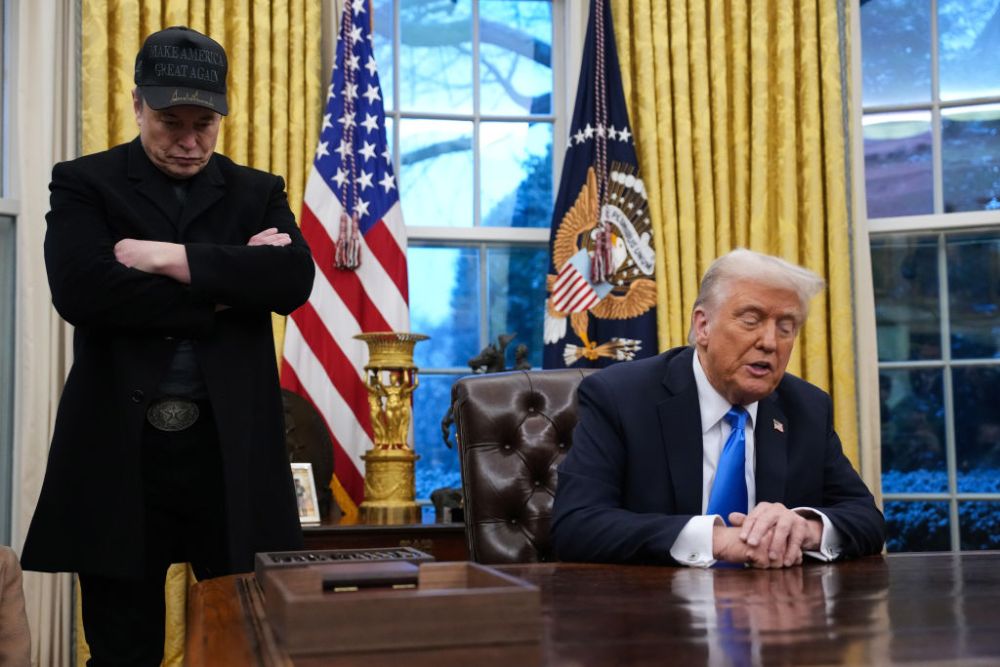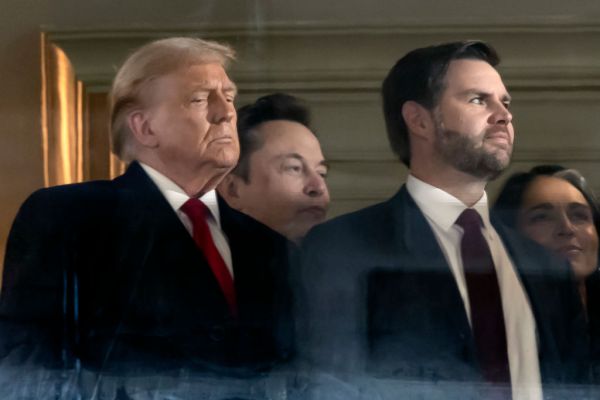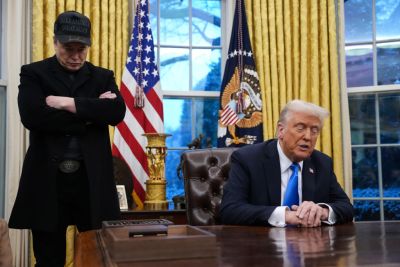It’s taken for granted in commentary about the president’s first three weeks in office that, at some point, he’ll “overreach.”
I’m sure I’ve made that claim myself elsewhere. It’s the nature of modern politics: New presidents sweep into office, misread their mandate (assuming any such thing exists), and alienate their soft supporters. The backlash will come. It always does.
What would a backlash look like in Donald Trump’s case, though?
That is, what sort of decline in his job approval should we expect to see from this alleged backlash that’s destined to arrive? In his first term he had a fairly hard floor of 42 or 43 percent support; between his current rosy approval rating and the fact that he won the popular vote in November, my guess is that his floor in this new term will be several points higher.
So, at the rate we’re going, before long he might start arresting congressional Democrats and his support will drop to … what? 45 percent?
But let’s say I’m wrong and he ends up doing something so hair-raising that even a chunk of Republican voters desert him, driving his approval down to 35 percent or whatever. So what? That’s extremely unlikely, mind you; his support never fell below 38 percent after January 6. But assume for argument’s sake that it happens. Would anything change?
There’s a sense in the warnings about “overreaching” that, if he angers too many Americans, Trump will be forced to conduct himself less autocratically. Why, though? Consult history: When authoritarians grow paranoid about losing popular support, do they tend to liberalize—or to behave more oppressively to protect their hold on power?
One more question about the alleged backlash that’s coming. If it’s not already on the way, why should we believe it’ll ever come?
After all, the second Trump administration has been a bull in a legal china shop so far, aggressively testing the limits of statutory constraints on its power. On Monday alone, Politico notes, five federal judges issued orders temporarily blocking Trump’s executive actions. Lawsuits are piling up on everything from funding cuts to personnel purges to data access for Elon Musk’s outfit to asylum admissions. It’s a safe bet that the administration will lose some of those suits, possibly most.
Which may explain why the public seems untroubled by it so far. The courts are on top of it! All presidents push the envelope a bit; when they cross a line, the judiciary pushes back and the president relents. Trump will be only as aggressive as the Supreme Court allows him to be.
If that’s what Americans have been thinking, they’re now officially on notice from the vice president that it’s time to think differently. And my guess is that, eventually, they will.
The limits of discretion.
J.D. Vance is a troll at heart, as so many of the most repellent and influential people of our era are, but this tweet from a few days ago is only half-trolling.
It’s trolling because J.D. doesn’t actually believe that each branch should respect the others’ “legitimate power.” There’s no power more legitimate than the power of the purse granted to Congress under Article I, for instance, yet the Trump-Vance White House seems quite intent on controlling that. Ditto for dissolving federal agencies: That’s the legislature’s job, in case anyone in the executive branch cares.
The more earnest part of what Vance is doing, though, is nudging Trump supporters to start questioning the legitimacy of judicial review.
Strictly speaking, to say as he does that a branch of government is entitled to exercise its “legitimate” constitutional power is to say nothing at all. It’s a truism, tantamount to declaring, “The president can do what Article II lets him do.” The question, which Vance is blatantly begging, is whether Trump’s questionable executive actions thus far are “legitimate” exercises of Article II power and which branch should properly determine that.
Of course presidents have discretion in using their power, law professor Steve Vladeck noted, but “what’s unspoken in Vance’s tweet is the well-established power of courts to police the limits of [executive] discretion.” If Donald Trump rather than the judiciary were the ultimate arbiter of limits on Donald Trump’s power, I assure you that there would be no limits. If the result of last year’s presidential election was like making Vito Corleone district attorney, letting Trump ignore court rulings that inconvenience him would be tantamount to elevating Corleone to federal judge.
Persuading Americans to tolerate that will be a heavy lift for the White House, even during Trump’s honeymoon period. Rank-and-file Republicans and MAGA-leaning independents weaned on respect for law will struggle to rationalize outright defiance of judicial rulings. If any civic affront is apt to incite an overdue backlash to the authoritarian project, one would think that the president trying to sideline the judiciary would be it.
In fact, I’m surprised in hindsight that the postliberal right hasn’t devoted more intellectual energy to preparing Republican opinion for this moment. Vance is a notable exception: He’s a smart guy and foresaw years ago that the Trumpist program would eventually require a showdown with the courts, so he began trying to shape the battlespace accordingly.
“I think Trump is going to run again in 2024,” [Vance] said. “I think that what Trump should do, if I was giving him one piece of advice: Fire every single midlevel bureaucrat, every civil servant in the administrative state, replace them with our people.”
“And when the courts stop you,” he went on, “stand before the country, and say—” he quoted Andrew Jackson, giving a challenge to the entire constitutional order—“the chief justice has made his ruling. Now let him enforce it.”
…
“We are in a late republican period,” Vance said later, evoking the common New Right view of America as Rome awaiting its Caesar. “If we’re going to push back against it, we’re going to have to get pretty wild, and pretty far out there, and go in directions that a lot of conservatives right now are uncomfortable with.”
He recognized even at the time that the public would be “uncomfortable” with letting the president consolidate power absent some legal-ish justification for doing so. So, per his tweet, he’s following the Trump playbook of justifying predation by claiming victimization. When, not if, the president begins defying court rulings, it won’t be a matter of him infringing on the judiciary’s prerogative to set limits on constitutional powers. It’ll be the judiciary that’s infringing on his prerogative to exercise his, ahem, “legitimate” executive authority.
That’s the way they’re going to sell this to voters—and are already selling it, in fact. An imperious activist judiciary, relying on judge-made law in Marbury v. Madison, is attempting to substitute its own interpretation of what Article II says for the president’s! Reminding them that that’s how the country has done it for more than 200 years won’t matter; there are a lot of things America has always done that it apparently now needs to stop doing, weirdly, in the name of making America great “again.”
It’ll probably work. I’m convinced that, at this point, there’s nothing the right-wing media complex can’t convince 50—well, 45—percent of the country to accept.
Needless to say, the president’s most strident boosters as he goes about trying to steamroll one of the few remaining obstacles to tyranny will be the droogs of the populist right who used to identify, ironically, as “constitutional conservatives.” And just as ironically, by doing so they’ll be clearing the way for the rise of a new “deep state” that’ll be more powerful and malevolent than the one they’ve spent the better part of a decade screeching about.
An unaccountable cabal.
There are a hundred reasons to detest populism. It celebrates ignorance, demagoguery, and cruelty. It’s ruthlessly tribal and therefore inevitably authoritarian. But it’s also fraudulent to the core. Practically anything populists claim to despise about their enemies is something they’re twice as guilty of themselves.
In theory populism is a reaction to the full-spectrum corruption of the ruling class: Our “elites” are so greedy and deceitful that they must be purged and replaced with a better, more patriotic class of citizen. But in practice, three weeks in, Trump is already buried so deep in sleaze that it’s hard to conceive of how brazen the graft might get before he leaves office. At this clip, public auctions of presidential pardons by 2029 are a live possibility.
On Monday he pardoned the ludicrously crooked former governor of Illinois, Rod Blagojevich (whose federal prison sentence he had already commuted in 2020), seemingly for no better reason than that he’s a former contestant on The Celebrity Apprentice and Trump sycophant. He also fired the head of the agency charged with protecting federal whistleblowers. And then, for good measure, he ordered a pause on the federal law that bars U.S. companies from bribing foreign officials.
His Justice Department also dropped pending criminal charges against New York Mayor Eric Adams, who met with Trump recently and was heard telling aides this week to stop criticizing Trump and his immigration policies. The DOJ memo on the matter explicitly didn’t question the strength of the evidence against Adams, per the New York Times; the reason given for letting him off was a nakedly political one, that the mayor’s cooperation was needed to advance Trump’s immigration agenda.
We’re on Day 22 of this administration and already it seems likely that any federal defendant with connections to the Trump White House or of some marginal use to the president will be functionally above the law until 2029. Even, in some cases, if they’re violent offenders.
Corruption is just one example. Pick anything that populists on the right claim to abhor and you’ll find them practicing some version of it that’s at least as pernicious as the left’s. Stolen elections? No one got closer to stealing one than Trump in 2020. Media bias? No arm of American media is more slavishly propagandistic and indoctrination-minded as right-wing media in the MAGA era. “Woke” identity politics? You’ll find numerous Christian nationalists and racial essentialists populating the “woke right,” including a smattering who now occupy high-ranking U.S. government positions. A preoccupation with “critical theory” focused on exposing “structural” biases in American institutions? Yep, the right has that too. We even have our own “defund the police” initiative.
And so once again, history buffs, we have a populist movement that claims to want to replace a corrupt establishment with something nobler yet in reality seeks merely to coopt it to work its own corrupt will. If, God forbid, we find ourselves in a new pandemic, I promise you that the Trump administration’s guidance won’t be some thoughtfully calibrated alternative to the “shut it all down” expert consensus during COVID. It’ll be “shut nothing down,” whether that’s sensible or not.
“Like before, but worse”: That’s populist government in action. So why wouldn’t the right also have its own like-before-but-worse “deep state”? That’s essentially what Trump, Elon Musk, Kash Patel and others are trying to build, isn’t it?
Ask a red-capped MAGA supporter to define “the deep state” and he’ll probably describe it as a cabal of bureaucrats, primarily in law enforcement and intelligence, who abuse government power unaccountably to persecute the left’s ideological enemies. That’s precisely what Musk and his team are engaged in right now and what Patel will be engaged in soon, except from the right. “The big-picture constitutional worry is that there is a kind of shadow executive branch that is existing and operating and exercising power outside of the channels the Constitution and the statutes that Congress authorized,” one law professor recently told the Washington Post of Elon’s work. That’s the “deep state” to a T.
This new deep state will have sinister advantages over the one it’s replacing, though—namely, a president who’s willing to shield cronies from criminal consequences to a degree unmatched in American history and an authoritarian ethic of power that views judicial restraints on its actions as an argument against the judiciary, not against itself.
That’s what J.D. Vance’s tweet was all about and it’s why we’re on the cusp of a major constitutional crisis not one full month into this nightmare. DOGE, Patel’s FBI, Tulsi Gabbard’s intelligence community, and the rest will not be able to consolidate power for Trump with the courts a chronic thorn in their side, so judicial review must go. For the new “deep state” to succeed, Americans will need to grant the president unprecedented permission to defy court rulings. The Republican effort to build that permission structure is now in full swing.
A patina of legitimacy.
Some would say that this is a weird moment for Trump and his party to try it.
They don’t need to. The GOP controls both houses of Congress and enjoys a 6-3 advantage on the Supreme Court. Surely the president can accomplish most of his goals by following regular constitutional procedure, especially if he twists arms among Senate Republicans and persuades them to get rid of the filibuster.
I think that misses the point, though. For Trump, this isn’t ultimately about accomplishing “goals.” I doubt he could even explain coherently what Musk and his deputies are doing rooting around in federal agencies’ computer systems. This is about consolidating power for its own sake.
Attorneys Bob Bauer and Jack Goldsmith fear that’s the plan as well. “They are … bombarding the Court with a wave of legal challenges about the proper scope of Article II (among many legal issues),” they write, “with the aim of provoking a confrontation over the legitimacy of the existing legal order, at least with regard to Article II, and perhaps more broadly. And the administration might be planning to dare the Court to say ‘no’ with threats of noncompliance.”
It’s an opportune moment. Trump has never been more popular with voters; congressional Democrats have been caught flat-footed by his offensive; and congressional Republicans seem unwilling to say no to him on anything. The courts, meanwhile, are overwhelmed. “So many of these things are so wildly illegal that I think they’re playing a quantity game and assuming the system can’t react to all this illegality at once,” another legal scholar told the Post of Trump’s early executive actions. Either that or, as Jonathan Chait speculates, the White House is planning to do things so flagrantly illegal in the future that they feel obliged to try to neuter the Supreme Court now, knowing that even a 6-3 conservative bench won’t tolerate what’s coming down the pike.
Whatever the explanation, if you’re planning to try to rally the American people against Marbury and in favor of de facto dictatorship, this period of “shock and awe” seems like the right time to go for broke. What will the court do when Trump threatens to tear up a ruling if it doesn’t go his way?
You don’t need to be a remorseless pessimist to fear that John Roberts and his colleagues will make the same devil’s bargain that congressional Republicans have made, bowing to Trump’s demands because they fear that the people will side with him, not with them, if they confront him. In Congress’ case, that fear has to do with their next primary. In the court’s case, it has to do with the judiciary’s institutional legitimacy.
If the justices rule against him and he refuses to obey, all pretense that America remains a nation of laws bound by a Constitution that limits the executive will be out the window. But if they rule for him, the crisis is averted—sort of. Everything would be working as it always has, at least superficially, with the president acting within the bounds of the law. By dodging a confrontation, the court would have salvaged a patina of credibility at the cost of sacrificing what was left of its actual credibility. It would have placed itself under the executive’s thumb, legitimizing authoritarianism as compatible with the constitutional scheme because it dare not say otherwise.
Our government operates mostly by fear at the moment, and it does so because Americans themselves don’t care enough to demand that it do otherwise. Institutions will resist Trump only to the extent they believe the people want them to do so. And so I end with the question I posed the day after the election: If you, or nine Supreme Court justices, are hellbent on saving classical liberalism, at this point who exactly are you saving it for?








Please note that we at The Dispatch hold ourselves, our work, and our commenters to a higher standard than other places on the internet. We welcome comments that foster genuine debate or discussion—including comments critical of us or our work—but responses that include ad hominem attacks on fellow Dispatch members or are intended to stoke fear and anger may be moderated.
With your membership, you only have the ability to comment on The Morning Dispatch articles. Consider upgrading to join the conversation everywhere.